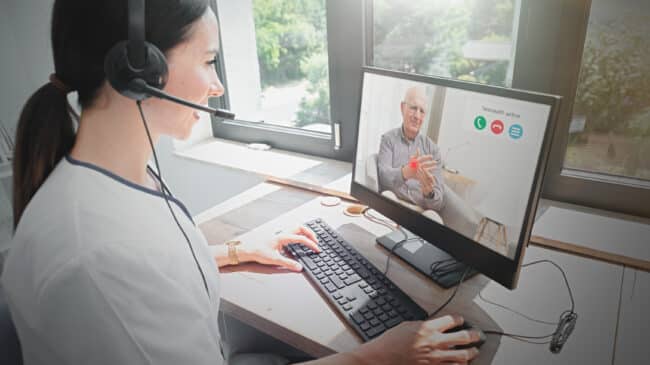The COVID-19 pandemic has helped to reveal where there are opportunities for innovation and expanded access to care in the health care industry. For example, for the past year, telehealth has enabled patients to access health care services despite stay-at-home orders, social distancing measures, and extraordinary demands on health care resources.
A patchwork of regulations normally limits the use of telehealth in states across the country. However, emergency actions in Louisiana and several other states have allowed telehealth use to increase dramatically throughout the pandemic.
As Eric Peterson and I explain in a new report published by Reason Foundation and the Pelican Institute, there are many ways to improve Louisiana’s telehealth laws and ensure that telehealth remains a viable option for patients and health care providers after the pandemic subsides.
One of the principal benefits of telehealth is the fact that it enables patients to connect with providers across vast distances. Unfortunately, outdated state licensing schemes often prevent health care professionals from providing telehealth services across state lines. In 2008, state lawmakers passed legislation that allowed out-of-state physicians to practice telemedicine without obtaining full Louisiana licensure. The legislation directed the Louisiana State Board of Medical Examiners to issue special “telemedicine licenses” to physicians licensed in other states.
Similar reforms in 2014 allowed other licensing boards, such as the Louisiana State Board of Nursing, to establish telehealth rules–including rules that would allow out-of-state non-physician health professionals to provide telehealth services to patients in Louisiana. However, the legislation merely provided licensing boards the option, rather than the mandate, to issue rules related to telehealth. Consequently, only seven of the 25 provider types mentioned in the act have any rules governing the practice of telehealth. Of those, only Speech-Language Pathologists and Audiologists have an out-of-state registration process.
Rather than allowing greater flexibility, the lack of rulemaking means that there is little guidance on telehealth for most providers. This creates an uncertain environment for those seeking to provide services in the state and unnecessarily limits patients’ access to care. Additional legislative action is required to provide clarity and expand out-of-state registration to all providers.
New applications of telehealth are constantly emerging, but regulation often fails to keep pace with innovation. In Louisiana, outdated rules and definitions limit the range of telehealth services available to patients and providers. Louisiana law distinguishes between the terms “telehealth” and “telemedicine” even though the terms are often used interchangeably. In general, the state uses the term telemedicine in reference to services provided by physicians. Telehealth, on the other hand, refers to services provided by non-physician health professionals such as nurse practitioners. Combined with a delegation of rulemaking authority, this unnecessary distinction has resulted in overly complicated telehealth policies that create significant disparities between health care providers.
Louisiana’s telehealth policies also present barriers to the use of telepharmacy and important asynchronous store-and-forward technologies.
The state currently allows prescription dispensation through telepharmacy dispensing sites staffed by pharmacy technicians who are overseen by a central pharmacy through telecommunications technology. These sites expand access to pharmacy services in areas without an adequate supply of pharmacists. However, Louisiana law prohibits telepharmacy dispensing sites from operating within 15 miles of another pharmacy. This restriction allows the use of telepharmacy dispensing sites where they are needed most but may unnecessarily limit access in some areas.
Asynchronous store-and-forward technology refers to the digital transmission of health data or information—such as x-rays, MRIs, or photos of skin conditions—between patients and health care providers. Importantly, these interactions do not need to happen live. A patient can send or upload documents for later review by their care provider. Right now, Louisiana’s differing definitions of telehealth and telemedicine complicate the use of store-and-forward technologies. The state’s definition of telehealth includes asynchronous store and forward but the state’s definition of telemedicine includes the “transfer of medical data,” through the use of two-way video and audio transmissions. As a result, non-physician providers are able to use asynchronous technologies, but physicians in Louisiana may not.
Telehealth use has skyrocketed during the COVID-19 pandemic, but its value isn’t limited to times of crisis. Telehealth has the potential to expand access to care and reduce costs, particularly in rural areas and underserved communities. Unfortunately, outdated regulations may hamper the use of telehealth going forward.
Louisiana could improve its telehealth policies by increasing clarity, eliminating disparities between physician and non-physician providers, reducing barriers for out-of-state providers, and recognizing all potential forms of telehealth. Adopting such reforms would ensure that telehealth remains a valuable tool for providing care to those in greatest need.

